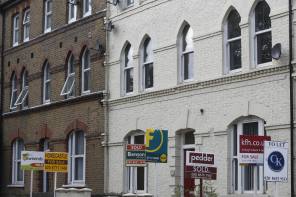

House prices have seen a monthly fall of 1.6 per cent after last month's spike but continue to rise steadily, according to latest figures.
In February the Halifax House Price Index showed almost a 6 percent monthly growth in the average cost of a home, but new figures from the bank released today (April 5) showed the average price fell from nearly £237,000 in February to £233,181 in March.
Over the course of the quarter however, prices were still 3.2 per cent higher than in the same three months a year earlier and 1.6 per cent up on the final quarter of 2018. This was within Halifax's expectations for the year, it stated.
Demand and supply in the market remained subdued however, with the latest RICS UK Residential Market Survey showing a drop in nearly every measure reviewed. The report stated price expectations and sales expectations showed a small improvement but both expectations remained firmly negative.
Using data from HMRC, Halifax stated monthly home sales remained steady with a 0.4 percent drop from December to February against September to November. February’s sales figure — 101,135 — was close to the five-year average of 101,135, it added.
Russell Galley, managing director at Halifax, said: "The average UK house price is now £233,181 following a 1.6 per cent monthly fall in March. This reduction partly corrects the significant growth seen last month and again demonstrates the risk in focusing too heavily on short-term, volatile measures.
"Industry-wide figures show the number of mortgages being approved remains around 40 per cent below pre-financial crisis levels, and we know lower levels of activity can lead to bigger price movements.
"The more stable measure of annual house price growth rose slightly to 3.2 per cent and is still within our expectation for the year."
Mr Galley said the need to build up a deposit before getting a mortgage was still a challenge for many looking to buy a property, but the combined effect of fewer houses and fewer buyers continued to support prices in the long-term.
He added the ongoing uncertainty around Brexit had a notable impact in London and meant the capital should expect subdued price growth for the time being.
Chief executive of Octane Capital, Jonathan Samuels, said prospective sellers and buyers were holding back for Brexit, an 'unprecedented political drama', to play out.
He said: "Interest rates are low, the jobs market strong and inflation around target, but Brexit has torpedoed consumer confidence.
"What activity there is is largely being driven by opportunist investors who thrive in the type of uncertainty we’re currently experiencing. For most, the inclination is to play it safe rather than make a move."
But Danny Belton, head of lender relationships at Legal & General Mortgage Club, said the stable level of house price growth was good for first-time buyers.
He said: "This is being supported by increased innovation and competition in the mortgage market, allowing borrowers to choose from a wide range of affordable products.
"Government schemes also play a vital role in helping those who are struggling to raise a deposit step onto the property ladder."
Lucy Pendleton, founder director of independent estate agent James Pendleton, agreed buyers were showing caution while the UK remained in a period of limbo.
"It’s no surprise to see prices fall back this month as low stock levers and general buyer malaise plagues the market," she said.
"The annual figures are a more reliable indicator of market conditions, with much of the growth in house prices figures outside London.
"Buyers are understandably showing caution while we remain in this period of limbo, possibly in the belief there will be better opportunities to broker a deal after we leave the EU."



